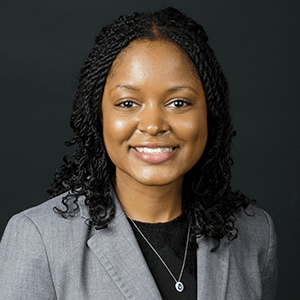In celebration of Black History Month, the American Statistical Association has recognized a group of 12 Black/African American professors, researchers, volunteers, and health care professionals who have made tremendous contributions to the statistics field. We are extremely proud that of the 12 people featured, 4 are members of our Harvard Biostats community.We will be featuring their interviews over the next few weeks.
 Alumna ALISA STEPHENS-SHIELDS, PhD ’12Affiliation:Assistant Professor of Biostatistics, Department of Biostatistics, Epidemiology, and Informatics, Center for Clinical Epidemiology and Biostatistics, University of Pennsylvania Perelman School of MedicineEducation: BS, Mathematics (Spanish minor), University of MarylandAM, Biostatistics, Harvard UniversityPhD, Biostatistics, Harvard University
Alumna ALISA STEPHENS-SHIELDS, PhD ’12Affiliation:Assistant Professor of Biostatistics, Department of Biostatistics, Epidemiology, and Informatics, Center for Clinical Epidemiology and Biostatistics, University of Pennsylvania Perelman School of MedicineEducation: BS, Mathematics (Spanish minor), University of MarylandAM, Biostatistics, Harvard UniversityPhD, Biostatistics, Harvard University
I was born the morning after Christmas, which is why my parents and two older brothers always called me a late gift. We lived in Teaneck, New Jersey, where my mom—a stay-at-home mom from Jamaica—and dad—a civil engineer who grew up humbly in Jersey City—decided to settle. Our house bustled with activity; neighborhood kids were always around, playing in the yard or huddled over the latest Nintendo game.My brothers and I loved Sierra On-Line computer games. One of my favorites was the Island of Dr. Brain, a puzzle adventure that introduced me to the Tower of Hanoi. I was elated the first time I arranged all the discs on the right pole and then again when I determined how to complete the task in the minimum number of moves. Through various games and activities, I learned I enjoy problem-solving and finding patterns, and I had tremendous family support in cultivating these interests academically.As a graduating senior at Teaneck High, I declined offers of admission to Princeton, Yale, and my dream school—the University of Pennsylvania—to accept a full scholarship to the University of Maryland, College Park. This decision freed me to seek opportunities because of interest rather than need.I discovered the thrill of contributing to knowledge through research during a first-year summer job in the lab of a theoretical ecologist. When I stumbled across the career profile of a biostatistician in my junior year, I recalled an earlier conversation with a dormitory floormate about public health being the study of health in populations, rather than individuals. A summer research experience at the University of Medicine and Dentistry of New Jersey the following summer confirmed my interest, and I continued to pursue biostatistics as a part-time research assistant at the National Cancer Institute in the spring of my senior year. After a gap year that included a six-month community service immersion in Costa Rica, I enrolled in the doctoral program in biostatistics at Harvard University.Although I am now nearly a decade out of graduate school, one of my proudest moments is still my dissertation defense. Earning my doctorate is the hardest thing I have done by choice. Having always been a strong student, I was unused to feeling completely lost or stuck. Previously, I never thought about quitting something I started. Reaching the other side of it was extremely gratifying, and I emerged a capable statistician, equipped to be impactful in many streams of research. It was also meaningful that my family saw firsthand how I expertly fielded questions.I am also proud of contributing to the success of students I have tutored and mentored, including high-school and college classmates, my older brother as he applied to business school, and the biostatistics graduate students whom I have formally and informally mentored through publications and presentations and into professional positions.



